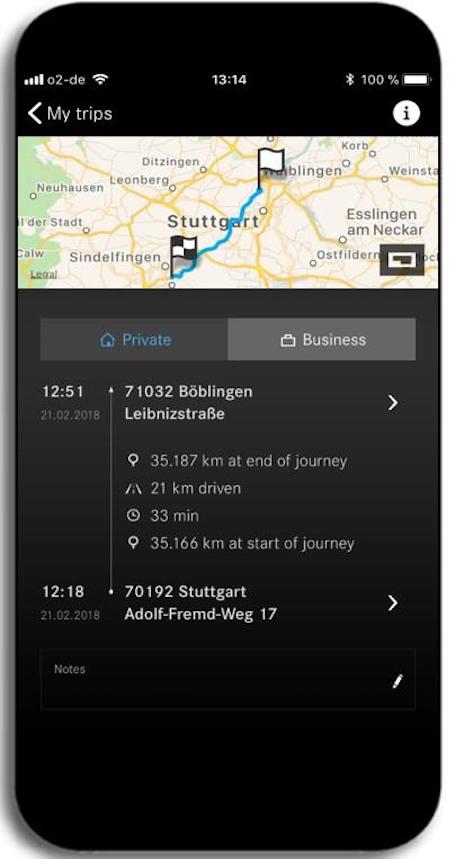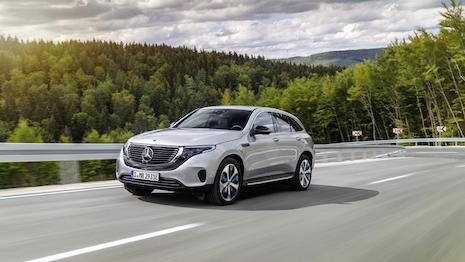German automaker Mercedes-Benz is further committing to an omnichannel strategy, as the marque expects to sell 25 percent of its vehicles online by 2025.
Central to Mercedes-Benz’s “Best Customer Experience 4.0” initiative is the Mercedes me ID, a single login that will follow consumers across channels. Not only are today’s affluents becoming more accustomed to researching and completing big-ticket purchases online, but enhancing digital tools helps automakers better understand their customers.
“Mercedes me and the integration to reach customers how they prefer to communicate, use the services and purchase vehicles is a smart way to transition away from the dealer experience, which can be time consuming and stressful,” said Lauren Fix, automotive expert, the Car Coach, Lancaster, NY.
Ms. Fix is not affiliated with Mercedes, but agreed to comment as an industry expert. Mercedes was reached for comment.
Mercedes me
Mercedes’ updated strategy was unveiled by Britta Seeger, member of the board of management of Daimler AG responsible for Mercedes-Benz cars marketing and sales, on July 18 at a press presentation.
The automaker plans to use the Mercedes me ID to streamline experiences across channels during the customer journey. However, consumers do not necessarily need to own a Mercedes to use the ID, as they can also use it for car sharing and similar services.

An earlier version of the Mercedes me app
According to Mercedes, there are more than 3 million active Mercedes me users with an activation rate of more than 90 percent for new Mercedes vehicles.
A new Mercedes me mobile application is expected to be released in the next quarter, eventually encompassing all of the automaker’s mobility and connectivity services. Since 2014, the automaker has developed more than 80 mobility-related digital offerings.
For instance, Mercedes allows new A-Class owners to seamlessly share their vehicles with individuals of their choice through its application. The feature allows users to share their vehicle with only the group of people of their choice and opts for heightened security measures (see story).
As of 2018, the range of digital services offered through the Mercedes me application and program were extended to older models. Through an adapter, older models are able to receive connected information similar to new models (see story).
The automaker is also rethinking its physical retail strategy, an indication that luxury carmakers must still provide engaging experiences at dealerships.
Employees will be empowered to better assist customers through improved coordination between sales and service teams. Star Assistants are the first to welcome customers, and will redirect them to the appropriate contacts.

Mercedes' pop-up series in the United Kingdom. Image credit: Mercedes
Product experts will share in-depth vehicle information, while sales consultants assist with purchase agreements and other financial details. Vehicle owners will be supported by service specialists.
In addition to dealerships, Mercedes also reaches a wide range of consumers through its temporary pop-ups, which have included a Lil’ Benz Dealership where children were able to test drive its toy cars (see story). Held in various cities, Mercedes’ Brand Centers offer an environment for consumers to explore the entire range of the automaker’s offerings (see story).
Online car buying
Mercedes has also made public that it expects to sell a quarter of its vehicles online within the next six years.
Research from Boston Consulting Group finds that car buyers are relying on more online resources before ever stepping foot at a dealership.
While 80 percent of car shoppers do online and offline research, an astounding 95 percent spend more than four hours researching cars online. Armed with more information, drivers are spending less time at dealerships, and total dealer visits per sale have dropped from about four to 1.4 in the last 10 years.
Although only 5 percent of those surveyed would be willing to purchase a car without test driving, 40 percent would consider buying a car online (see story).
Beyond online shopping, Mercedes is rethinking the typical journey. The marque is looking to make the buying process more realistic for consumers in a new test-drive program.
The automaker is now allowing customers to test drive vehicles for 48 hours, so they can really get a feel for how the car will fit into their lives. Oftentimes consumers feel as though the short test drives at dealerships are not enough time to get a true understanding of the vehicle they plan to purchase (see story).
{"ct":"0qYmopLwye29G415qrnZcbSn+VBCwNI6cJte8XLwfwH7xNaLkMg6LwxTAuCwLACCpRoJMlJRp9G9ArXeMpSdb2glDDCNtqDkPTnUc\/7a4BnMxhTlf97RyLs39dy5Rzz7xmMKM2Yp35Z2c9hOGEIlI6ui5sB6pIVTSVakzJbh5qRkI8MP7HFlP07pfWDHzpXbjzF9BInZdQGMqO9a1bKTdralMj2BNQBT\/wSwBGDYU\/FUBfOqJVMJFUYjD21KApyFxDxlNjwlT8tfCKZ8k4d5\/ETIjgW5T6EvXoxM9coN\/ZvlLNKopZYmOKTXbvQY\/ooZ2ObXRohGj20LT+QFxZFBLuBvLTBEyn\/cdX+hhZro6o9WI6xS+Wxhstd\/G533RvsG2t0Xc\/IuAEtBacxLflkIYl8WSAY7iWARpWPIypGfcriMWKNJxJz3BY8unRi59Jp1WRBScMsSop9ga4yjrK5c\/1oLvOxcQ\/NGjQ88CClWCMyrhDlR5SQ7wc0QkN92K9vKaZiXN91Su+TclK3kTafzj8qmS21Ngka1Vr0NridR9wHZb9qt5guu1HY1aigjSa7LMYOkaeFmFeznIT2K4Eh+hhU0jOLzVEfL1bn9fcZLNlSkou8Cbhsrc6SKTVhJCbXO65xAVdstxNU8R8PLl5qKGcMkCMNtrE7AYekYuyUbGiEbIM8q9r\/azguLWxq1WPC19eHgVUC\/9NihfCgtg3oP073an+fmkfc0aaPg\/VKLq1lfvpUKlz6zqlsSS+bpxEiMp4ruSDLFECg9znAmjA3fUatw+TGGMtAXzTb2pZ21urOxDfw+1gZRAJ4LC6iHjCsl92yhQz4lmaQnM1Sv6pOOtXT7bPo3J\/0k8jERfUVRHWfKLu7\/6EqsGI5xGyO\/EP6imP+liw1RZTPTdZTRG1M5XjAOPOPffFeY4ovoFydppfAUghn7pk0mWVhDEdnOklXZHzeQEzofUHJmvusm9Ccrdg2iwJCqm8UWJiON9fQKrEJzlAf4ghgbVm\/vC\/hmUe7oTj3UdBiwcCTeNxe5vwfXTLO\/rxIa6XYLs3veaDhDYwdfL13\/01NMIusc0YMiCvCP4XndZ5r21HSGSkTnuYQGD+tOn2E4aZ7IkZDAjCpiaZkIF\/JyQpYZ6zVFeeR9mmlhdnxjmzig2GIIEUtanqyzEbG0RlcHyNhpbVxV9K2ez1\/C2gl7z80Emt5PIwsxwKToLi7xLQWxZgtPd8fMVzUien509q9OM1FbXJ\/D2IV98s4LdROdpllWWu+O594XCd+NX8WFmGDygYBoskcuT4Batf1U7eDU6EjXt04rlqJRf0KcM61ga2sNkYZopnCpaMbFpq0gniWM1+0CxTXTo9VDWlCOSshMPHn5UbSYxZgMQQHLWKVn37WjHCHbvNOb7z+y6aclCcOhUwZxP2hMK+av1N6dCnTsWSkM9zaMlaWQJH7yFS75ZKArM+SR55hYK5rOHjS7dOizS4NEkpS+0FOcV\/H\/spDkgb4lcx0h0UPj6OREF+RIRa0Z2EUG40k5VIJtZUzR7p3sb9zArAt0xZIao2+0EyGxqdxxZFiJ2LYSSNYBCQ0Q37EvjkpPjcJZZS1wvZDoG1BnlpsUYDsBC9FVxLGyrvZwdgIeBA0wXR6fitA20TGIw41B\/nTC\/YaazuQTcnJ7r5j6ZZyXjyEAZVcShgQ1hl1fykQZqBUXhqaIYD65r9zU3cooMXVMtdLl8huMiUrDfvg+g02CXI1rogN6q0O0opyeNftH680Zd5Tr57GnYMxb81b\/YgfHEhkoN1jcYU2y+gQGPBqrpXBkUOw5nxJkI4P1IzgzQl3p6xOLqKM1D3jKG+MOzYk3nPNtaCrfO9F18ASmBx4vvqLvCLJ8XFPxWACP8oQC\/oKh2EyciSLnHKmL\/73QcvYQkJqBUG1UNfxLG2yI8aUkp3Vs1J0nLs2yf6bMjzKZP1mMJCGUjWxABeTB\/cvRl8XvfXjm910FlKyLObAITcxfavwfbdmtDvNqZAoYr+rY5175V6vPHR9Fl4wQTMlZXyJ5stt\/RIhq+lIpXWAfzMPJBWD36TgtghlA7UWZ74YFsK6ij6xsiBMr5rvfzANisVLXYanYLXdc9qqnYQ0HRSeQl9MOmV1vHO1m1AqboUpp8L6o7j\/uTHe8PqwINl7RkIwsFCnoXgPp7gQHIs870Fy6bkvOumTD3IU\/IwIL8RdZSwaxLe3NSYSAnGLW7PgQnp0X+E+m8xUVjxFsF43ywum7UFYI7oF5+aFFPT4t+\/saBUa35U2x+P8rWF0NI08xmQaOL\/FFOIgIYSYAE4dLHwUQD\/GD3vRT9d7zjBhSsHZ\/QNE9HLo+hQQ37IeZEHuFnT5rj4QKmy5n+H623278tLa5bkfcyzSp9Ehal4ya2vu97nHWnfDMoza+aXVBa2WdwFIfIWJEpJiNMOYV8ZC\/iHhLtPL9mjI+2GpKHx4vxxBn\/FIvwqHDQhye6cuWoEq88yQtIRiRuTIGefuaTGYOBVkCZFPbgzRDbwHGnI5UKuAkc7XbiJjlkErPUpkPNSz4++EWFNmYnoLJRQaMXp1XHNVPCUmIk7EgiUCVarHbDTmoQEczl+UG4JctFuqLdDYzzR2VKHBaLe5yZxCJxoPLCBEzqnreNy34vkyr2u3PlnqFXXFV8561P1qIh7qatIt47rbSxY6YhfyLb1ooAl7YQgNkRzYKWhROijHr8q0dtkRiDzMuXCjsdzpdSmyIEGpLX8nsW+lWi5A\/vIiRadq0e5hm68Ndd5g5Zi1OtWYRRjEgbi6ZMWBkydDAj6pm+RLGMHMsMl4yYUZePUHqcCkcpPX6U5V6SLH4FnTUDXR0tlGVsF57LWpvP8qjFXupTr6FsGcBuZ2EbEp7BTGTsfeW1AWUG28TsZGoHZRGzOlhEmNP93EO8u4\/OPzFvmC33E5PiioIM9mgG2I\/vn0zZOLnjKwSyOaU+0zoML6\/jiEYdZ\/vfVl4gpCod8YMta45+ZwNknIk2+a9AI1SxiGXWy6cURbLT7wlwS1PybT2iBaeROtK2z6P1JPu8195bdnxZt4KZ+2P1FwM2rcM9gNhMcWe0cf5s7EWgvwoLjTGJaFqsDZwb0ATOVtWxJRPJi1BxUKUMvn0VXj0Y5LLZ49UPBK\/0CS6QmgbuJgOxZ2GhAHxBpYZa6QJwCwc8ch2FlxJrmtMqGHkDJLjOesfz8hiGxHKGPmnTFOMA2qj0P8GxKN88o6ldhKBlB94sphL1j4r0l9UghYobVBuqPQnrjCHv3zDn0oCCoosdjtZ1PcHWFavYcChv0pxGkvBZ5EOyoAJKeyMwMtqXdCH1UauvvNHc0ZnJ3Qe5UoFcgHxrZY+1HIt1aApNGgyxLeNAFKndMgn4vjLKYXgADxEtvz+8wRFnz5XtDZ298AzncnLK+MTcfRl7kUYbwg46AjqmgbKplmGXegcpVSh5BhoHDKAgyJ4j4ClRc2xz5Q18kM+ifG8uZ63EK7VT5fChwQ5Ei3qW0bU4MxHgQErWV0Qp7IU6lpsl9XhLhTbjHZSGs8fghKk\/zau27L0WZP5BA2ItK8w92UOJrX7cEYVQm\/o5QcZCFkihtIMxKeZ6SY4zLFtRe8wcM7lqf9BH1zS9h8EOmj+2ABuuzuCS7ZfiyrJQoAQmvp5ILoTcaRUybZtPGY6o4fKc0UnwtmwJNLRGabgKSv8DvRgO+PByB\/E5YkLOPBD4rqW6iCViUpDjdSbZ8pGRzq+r4zPpnom2lKPNAoV0JBJOfd++PN\/4z7JfyEfR5Jn8xyhvIazK6truG9ebC2HxOYAtY2UGLoaT9ZEViDkFgLi8M7SzHanTOJ\/qBTvlky0QR11I1hxfK3UpY\/3h2bvwcakYRBCQtEb2XWbqlISHvPMubKq+ILni56MLeLv+im9g+wG98XXkfMOljAEr\/rCTfsVx+cET4RiVUg1Iwc6PgDuiLlyoF6z0OAp9gqVWYd977W8cduJp2z688F+by+2eQjdGkshgLNx679oiWzlqpQQx9RQnBr9oV5DPnIuoopqflTgF0ifms8k9QDmzLwDHIehKd5PmqFMooLvtHWpP\/OOJg4pL+puqUBen2FErZc29is4cxaXoIqlrqlwypQHheuczkoYyFY5IF+ZiOguazMYVnUFzXHL5sj3EvaftJkcyoNLVmYiPbwR+CmRTCtSSY3qux6Y3jn9Dv71MAJy\/e1hLp08c2im0A9+V9pl6TerPRkVm\/\/8VDj6ELg8l9eVQlSkxGhCV5WltMTfPsV4pgviBl84gURZobMyxGUV7u1\/dr8+XxkhX977307lEHzGIc2F6PRvUarP5h74mqk8a4JhkGJE2oZjvOCw8BM7mYMNFjN3ipAiCz6S5SAc3US2CK+QrfzsLs6BLWfNMvDziL5lscsHLzYmF26pyEz9PHiD0bhydO5CYjVqRDa3RYHymudDiqeDNrVavBLhCGVfGGhmTQwVxDXqRJUrosCfb7d3dWyD5FBGfq3FRXLBjZSGLKyJlWSlCMvzWuwH69fDyPAhwRRTy\/SgutTedLXJm4\/SnoEh8uVX9s6IJaOdrLre6nma0neXY6wQgk5VOs4tQiR2mKSXMDrB30Y2pUoglagRnw5eslWpaFNnpv+CquN+jIKaQ\/eh9GeM+NCTgdLuDPFQzs7GXvcb5JBV4UtTV9\/wdQGBRYXnfy+UXdePJI1uaAz0HQXlkNX2QMi356MMtLvgKq\/+OUTPfGEDlGjhWGz9I5k\/GhSKwzJhR06BuhNARmIqCgCINH1E44tRLCKdI\/rnuqgxM4f9PZqUwS2f+SaIe6lkNhx4V3jD2BFIRgPxWUM\/X04huDpsOBj2J0s0VOSb\/t4JCAgyWdwV8dcjf66RKo\/qOlxTtjLvGOfyl6WbYtWaAjX\/BRYUU2fcWAnCCv2YTsWZd2966f51pT4Uk88h5HTen74Q4cuS9tQ0DlexgP0tgLSWTlO7NrDOPJ6pRA3jUoEWF9pDF2aZH7BjFDEiuRAmvwsPPQU0yJowiz7vGPkf67BOxoJ3k\/usNxjoIBzqCoYdYkzW3JpWQc4iSVPR9dk9s6cUn7ri\/R\/2AmTOc3rPTuhZgz\/BgaULBWStk\/5IZ4QnxvW1eqCzq9k5YIPchDm7vgbItayREkWwiq01emz\/c8Nf9gGQ9D2oY3GmWa2Ik8EO4YLjrU4WHbXkjXnZOAmfzBRXx1hg2wBwuTau\/Tss5tGByn9bbaDJw72fQ0ZiNHxdYHsXKNaDtrNt2h4QLNecHsvPDyh\/1430fiIXarRHb4jJCmKuLbj1FfDLFVht6+BH3onXOp7XQ8MkWrmF0mRA+35r2xsem6xDdIzoI0PlG\/I1d7I6ifgxGOwAn5CLOr8SusqqFLwoo\/Zt5oqTkcBKA9D2sJ4hmhkGlnkdbk8FRy3hlGbZhe3U5OwYC0MNNsaxXqH9pi+o6PFrvOHE8qJZA2Iv7Z6bA22Q5tOEkXjQDXQDOsAv5+m5qumEw0jtAg7i51HFAVsAyZDzISckozM1VC7xAGNKWoqEdpdphIzIaqWhNu\/4Gtk4KxxgtYfMmgUhQv2NBip267g0\/\/qQfYH9Yd6j2xC7cTaQdYGrRog3IXnuwIUB0lF921BtyeG42UXD1n3tyW\/uF5b1e9RllHzk3SEwf\/qaJHyq2eCfVKqbtkUb8K8WkGQil5DUC8cQtA+Oi\/SfbVV6HVsEf\/KGIeOJnLkRghTUihrBEUK0dggpq16\/rV3oaGF0jpijrj5+LiZ4z3\/Q8MTNO\/IhWi+xd+wfTdL5pDuKDOHFff\/AqmWF0yD0cwNIous3I8hFXnN51tcvL0p0W9lgejibRfPM5uzg0CUovCow6Wob4zayb05uDhq3RXXXyLgre+f+GlScqabCOeZC8yAeAQk3XV1GUpHyuwPy+BcPOAtoll1bOl19+4XWjvgKccCmeVr\/N4P\/jGIMx2g0S6tX\/9in7sz+mliqoX6ypYP6zsKX72LpAFygUsH+j+tAtaNnT02lc6ZHgIoBmzmMH0K1zdgEkGjcieupeHtf8tZyf8EDFHkpBWYv8jw8ZGQvajAHD+YkKs+yo9++vnU+JTrR+Jbprx1O2gjbtiVrPWsuKpgN6YpGAFtGJ6EjNtqwSBRJft\/C+Cucgj76dzQJZCBtMe5ns7YKiW4hf82C+RZeHfplU77G8MpI+hmujVByW6svAb\/SgAhp6z2jC5F3ILG0vpzq49oHmttG3C08HFj8\/HRceiJR0KkUBgK2e3XA\/B4WJ7PKoPobJDvRnLIxEzyNZNy1TnBrwJqZHw1lSDOp4TIoUghkP7rv\/CrrC\/\/f34\/QweKsMMkudxAwpvD+Yj6mswEbqankxG51C9km+yItpMOKnIt1NRyhCekgL8jb+mDYzIo2OUyQnvm+yDIOVuFuRMoCEQx\/oXFfsgJx+igqJSsxYt524UUUoO8LyzfuOodpEBJ0L63mdLnGp1NoWo2zAhtjPsHADnPnPSuiEyX7bIeCi+LQaCCiMhw5lk8ve3g4iuoXjLVwcbYm3nqSf0o81KQ6zqo\/jGpzw\/I1q1\/RdqXQNJPB6S9cj\/iOovs7PE+NzsS2G09bx28L1O3VYZrg1c77DgMhNa9nfVRam+cuoSSudbQMcXEE4cSIeo6qe6xQVUS0dgywSxdaVJxAqYGmnOWwGJciFd6+Lcaieth2Df0jYvTk23VhljscL8EW9tFnPdolsw8adoUqTF6JZmvpUxvWXUv2KW0tIDAU31e\/1oYC0iwmxpvMsVEmmYTbyxMgj\/dQtlOnltM8Q3zNpiYblIJPIP6g7iU4ciclDdu8cZxXuUpUoOL8AXxnR\/nEop8HoRAxinFisyP0WPfYpHPDd+wyA\/4Cj58mG7f80dlgHsL1JIuUT4Xe5N0zNORJ3oM43m2X6u5PvNxW9DPvE0jyFSQL8TzDW3roi9BenOB8VdipF0or7czcwYGF0lblLgKPIUuM5sUZ30\/WaBX0HzU\/nQGQHfp55ez6pBHkgXwYosrSRvuPkHfukELbSzoIcDKV5z4utn7wu4J7U4w7z\/1hL7PoU3tVphroRxGDK41tvXLMe+QyYl3aG4PzbwKIb735klyHpxpgpZXnOKF3deHifvGmYD9TfS6GmUtLoEEKFpGAcKdUdTh9RIC3SOQ6KIrg9bm2r1mGzka86lN7bcPWiwDtpWZqak95fvsTsHoN9949VXOweMqrKuoJ315MhJJgLzWp0PWsqhc84MJt8VnD19oOqZ2U+l5STHLO00BAGc8bi2muyJmdrdenl5Sh+0p3CRO8Tyh\/pAguZK26kbADi0qsICSPe1IC9R9hdNDFn6ag52YRez3hOkE\/UFi87hr+CDlArKRwWq13I\/dx1ZaAh0OyTs5vfvAe5WP7+zmL+98fGQ9yLmilKnCwsUsoWKjQMM0nr8b+etaQla4uL20xuFXmbdJ0dCGBC5ui8xcrO7olefYa22PO0ARIuMkayzIxtiPqZ4Ggxi\/SynmWwwBnNSbB9kIOP8X4LHg6zF8zVg+VPXAbFw+bpQGR+x1y9Z5CrFAQ+gOamrO1kydnjMYm92V1lOkHKPBx7GYkfLPbSIJrjEdKPWIzIRjKBuMFxF61ychmTZWorW3vde7Q\/bHNokLAWYKS9PD8snWR+CRsXrhvFdgUM1SlR2DPvB4Vf4yvUrYaKDhtCLkl7B9j\/UpjbyJW9ffUtH2P+7c+rI6xciZ6NeytwF6I+7f7v8UZKEI9vSYDYSfabBtGIVcoidJDcnHPbYkaJY1+3cr8Lw2lVwmeIg4ajW+OSZmM4RwEqp88hETS5z7J5ET+C2n+Mxjwn3DKwiLbuAgaHVtorT3e5jpLvCeq1GXmb+yEHdTMcu+H7pA1hGph32jRUD00Hu48Qo7bZA\/\/iyeC8dQBmb7N7jnJ20gphz7di6eGTuQBItVj+yVCcqHDpL9pwvrpid3mrFfax4gqo0gkLY4yNj7af13axZUT8778PPZKi9gE8Itr0kQyblAMc4JcVQJaT6CRAT\/wf5GfZvgGvkLwtPqdpFRfK54mlYuPSZzoHhui9Ll9Tm9DDs\/GRpfndhvBU3uBTWlNFPLq7pvaEKc8VZu\/rvGxLouPY07wF9UY+hwJNmNSfpVXJm36NB\/asPz\/dwsxyTC\/rcZtY5qcZbJ0E2tT9yA1tug4YROLNqoJy\/XpITNlwF98gAbgGoU62Rdg9\/Juit2Eh+rSEymaUUb9q9DurjXxghxWc1XibBjeZBtviaVsNJiA\/mwBbB1FdJ0IPb3L1Auz\/Em8In\/x\/leXG0X1RR9KSViwgOYfPj6hBnWsIcSgR4lJUMvdEtqxgJZAtwhLJqbAkuJP+S3TOEN77PCUIS+GPL88nI8MKA6TRwbx3JX9OCwcLqsZT8XTLfD2NI4Jpx5jmXH1cUdQeDGxXJQDIfgq9we6cvNlBAQjiXX9kTM8NY0XfnHOkq83Wgs4WI6G4ayjHrXjEZ1fOfNMFOKnE3SoCYewR8lQiB3V435YNPHxnvgJ2rqZdY\/hcMHubfZq1EIDI3n\/YOmMlCuffgXbK0\/aljf\/cnxxy2GcIZ\/SgRWAC8yhhIs\/gXhCFbTuv1q\/6gtY8Tlq3JKziP00EX32WL8jmL0KkVEBkOpICm\/qISi\/IxDEFxzm+7YhlHs\/dEL+LTtg9zjEzQpwNLrA6hvCKSww+66cm0Pme1eW7ZThpDx68vUDTWW4ICeVf6Q7GKVCewCUysiAQNNCtwoe9Silqi0hBFzi6MzkvQzxq2Nk2vDGjkrcZqoV0Nb0\/FcxPLGfTAWlnAXB6uRIlKvRPRcfxkZhhbyc0tapBLkxlDCZo5R256ZENFOJKf85GYRESKWpQlfJ5q4+DDBoUYIk94n3NkPrEqNZNoHBuCrOQywZNY682LmfZl+gxreDUxkfx6JQafPgJZRUnTYV84JjbV\/sns87lX0H+mUTQfoRCAm\/JUF2yQEjtNg=","iv":"dbad951f1cde1a3a07397c1daf803a92","s":"7f4f90f1665f6a98"}

 2020 Mercedes-Benz EQC. Image credit: Mercedes
2020 Mercedes-Benz EQC. Image credit: Mercedes